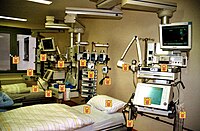
Photo from wikipedia
Background. There is significant diversity in the utilization of antibiotics for neonates undergoing surgical procedures. Our institution standardized antibiotic administration for surgical neonates, in which no empiric antibiotics were given… Click to show full abstract
Background. There is significant diversity in the utilization of antibiotics for neonates undergoing surgical procedures. Our institution standardized antibiotic administration for surgical neonates, in which no empiric antibiotics were given to infants with surgical conditions postnatally, and antibiotics are given no more than 72 hours perioperatively. Methods. We compared the time periods before and after implementation of antibiotic protocol in an institution review board–approved, retrospective review of neonates with congenital surgical conditions who underwent surgical correction within 30 days after birth. Surgical site infection at 30 days was the primary outcome, and development of hospital‐acquired infections or multidrug‐resistant organism were secondary outcomes. Results. One hundred forty‐eight infants underwent surgical procedures pre‐protocol, and 127 underwent procedures post‐protocol implementation. Surgical site infection rates were similar pre‐ and post‐protocol, 14% and 9% respectively, (P = .21.) The incidence of hospital‐acquired infections (13.7% vs 8.7%, P = .205) and multidrug‐resistant organism (4.7% vs 1.6%, P = .143) was similar between the 2 periods. Conclusion. Elimination of empiric postnatal antibiotics did not statistically change rates of surgical site infection, hospital‐acquired infections, or multidrug‐resistant organisms. Limiting the duration of perioperative antibiotic prophylaxis to no more than 72 hours after surgery did not increase the rate of surgical site infection, hospital‐acquired infections, or multidrug‐resistant organism. Median antibiotic days were decreased with antibiotic standardization for surgical neonates.
Journal Title: Surgery
Year Published: 2017
Link to full text (if available)
Share on Social Media: Sign Up to like & get
recommendations!